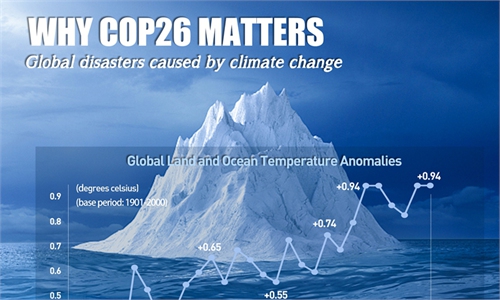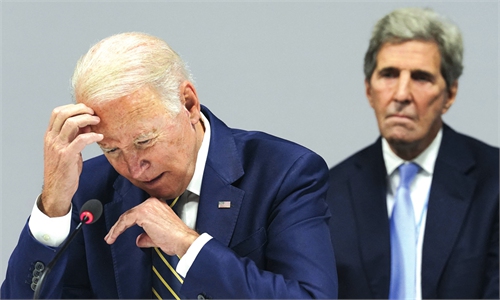Scheduled to close on Friday, the 26th session of the Conference of the Parties(COP26)in Glasgow, Scotland has entered its most intense time in its final hours. As the first conference after the Paris Agreement entered the implementation phase, what outcomes the conference could achieve might be crucial to the future of mankind. On Wednesday, China and the US released a joint declaration on tackling climate change during the ongoing COP26 in Glasgow, including setting up a working group and reducing methane and CO2 emissions, marking a significant move on global climate actions and sending strong positive signals for the success of the COP26. China has made great contributions to global climate governance through its green development, participation in international negotiations, and multilateral cooperation. During the COP26, the Global Times (GT) reporters Shan Jie, Chen Qingqing and Zhao Yusha talked with Xu Huaqing (Xu), a senior expert from the Chinese delegation and director at the National Center for Climate Change Strategy and International Cooperation to understand China's position and expectations to the achievements of COP26.

Photovoltaic power generation project in the field of a village in Nanning, South China's Guangxi Zhuang Autonomous Region
GT: What is China's main proposal and position at this conference?
Xu: At COP26, based on the principles including common but differentiated responsibilities, developed countries should fulfil their promises as soon as possible, discuss the solutions of global energy transition and security jointly and make greater contributions to the global climate governance system.
The first is to promote the fulfilment of finance commitments. Developed countries fulfilling the promise could be a key to COP26 success, which will help build confidence in the climate process. Though during COP26, US President Joe Biden said he would "double funds by 2024 to $11.4 billion per year to help developing nations deal with climate change," to achieve success of COP26 in finance issues, other developed countries such as Australia, Canada, and the UK must promise to add an extra annual finance of $2-4 billion. It also called for the trust and support of African countries, the least-developed countries, and Alliance of Small Island States.
The second is to explore ways of energy transition. China has vowed to strictly control the coal-energy projects and to support low-carbon development in developing countries, providing its solution to the international society. Although President Biden emphasized at the COP26 that the US will invest in clean energy in the recovery of the economy, he did not announce substantive measures. Similarly, the technical assistance initiative proposed by the COP26 chair country's Energy Transition Council neither listed financial and technical support required for the transition.

Xu Huaqing, a senior expert from the Chinese delegation and director at the National Center for Climate Change Strategy and International Cooperation
GT: China's commitment and practice in cutting emissions is gaining global attention. US President Joe Biden has chided China for not "showing up" on the climate issue. Do you feel the pressure of some Western criticism and what is your response?
Xu: Climate change is a severe challenge faced by the whole humanity. Since the industrial revolution, human activities, especially from developed countries have skyrocketed the amount of greenhouse emission and hastened global warming. Thus those countries were asked to lead the task of cutting emission by accords such as the Paris Agreement, and provide developing countries with finance and technology to help them deal with the task. Hence, US and other Western countries' criticism against China's actions and policies on climate change and China's achievement in this field, is arrogant, prejudicial and impractical.
China has unwaveringly stuck to a green, low carbon and sustainable development path, and contributed China's wisdom and plan of tackling global warming to the world. The country's roadmap of hitting peak emissions before 2030 and for carbon neutrality by 2060 is way shorter than that of the developed world. The word "before" in those two goals reflected China's scientific respect toward future uncertainties, and the courage and responsibility of China as a responsible developing country.
Plus, China also actively participated in the global governance of global warming. It played an active role in pushing forward the Paris Agreement, and looking forward to conduct dialogues with US and European countries. It also joined the South-South cooperation in helping developing countries improve their capacity of dealing with climate change. In a nutshell, China is an important participant, contributor, and leader of global ecological rebuilding and international cooperation on climate change.
China is a developing country with 1.4 billion people. We also have the responsibility of improving people's lives. Currently, China's emissions per capita are only half those of the US, and cumulative historical carbon emissions per capita account for only one eighths of those by the US. Meanwhile, China, as a world factory, also bears large amounts of carbon emissions for other countries as it supplies commodities to other countries.

The COP26 in Glasgow, Scotland Photo: VCG
GT: Climate negotiations are always difficult, and it involves competition of interests. Western media and observers claim that there are not too many new goals or much new content in China's latest nationally determined contributions (NDCs). What are your thoughts on that?
Xu: China recently submitted its updated nationally determined contributions with a number of specific targets such as peak emission, percentage of non-fossil fuel energy in energy consumption and installed capacity of renewable energy. Compared to the NDC submitted in 2015, the new targets on peak emission, decline in carbon emission intensity, and an increase of proportion of non-fossil fuel energy are much more ambitious in the latest NDC, with new added goals of total installed capacity of wind power and solar power to reach 1.2 billion kilowatts and above. The updated NDC is not only China's great contribution to global governance but also higher requirements for the country's work on combating climate change.
To achieve these new goals, the updated NDC also clearly stated 13 new measures in reducing emissions such as promoting a comprehensive green transformation of economic and social development, advancing the green and low-carbon transformation in the industrial sector and building market-oriented mechanisms like carbon trading.
We should also understand that China is facing huge challenges in reaching those NDC targets as a developing country with a population of 1.4 billion. It��s also a country rich in coal but poor in oil and gas, which is now in a crucial period of transforming its development mode. And it will take more time to realize the energy restructuring as it is difficult to fundamentally change the coal-based energy structure in the short term.
GT: Ahead of COP26, G20 leaders agreed on a 1.5C global warming target. How do you see this target? What does it mean for China?
Xu: Like Xie Zhenhua, China Special Envoy for Climate Change, told media recently that China has never been opposed to the 1.5C target, which was also included in the Paris Agreement - a milestone in multilateral climate change cooperation.
While it should understand that the long term goals set by the Paris Agreement require developed countries to set the example in reducing emissions, which is also the key to achieving a global zero emission target as soon as possible. Also, countries need to take strong concrete actions rather than making empty slogans.
China's target to achieve carbon peaks by 2030 and carbon neutrality by 2060 in order to achieve the targets set by the Paris Agreement means that as the world's largest developing country, China will achieve the largest decline in carbon emission intensity in the shortest time in history.

A polar bear Photo: AFP
GT: The issue of funding for developing countries is also a much-debated issue. If we cannot meet the funding demands of developing countries, what impact will it have on COP26? What contribution has China made in South-South climate cooperation?
Xu: Climate funding lays an important foundation for maintaining mutual political trust in the multilateral climate process and achieving the goals of the UN Framework Convention on Climate Change and its Paris Agreement. It is also a core concern of developing countries. At present, developed countries have still not fulfilled the political commitment of providing $100 billion in climate funding to developing countries each year made by the Copenhagen Climate Conference, and the public funds provided by themselves account for a relatively low proportion, which is difficult to meet the funding demand of developing countries in dealing with climate change.
Developed countries should fill the $100 billion annual climate funding gap before 2020 as soon as possible, create a positive and constructive atmosphere for the success of COP26, and make concrete efforts to maintain mutual political trust among all parties and the seriousness of the multilateral climate process.
This $100 billion should also be a starting point for developed countries to further sustainably increase the funding of climate actions to meet the demand of developing countries' efforts and improve the traceability as well as the transparency of climate funds.






